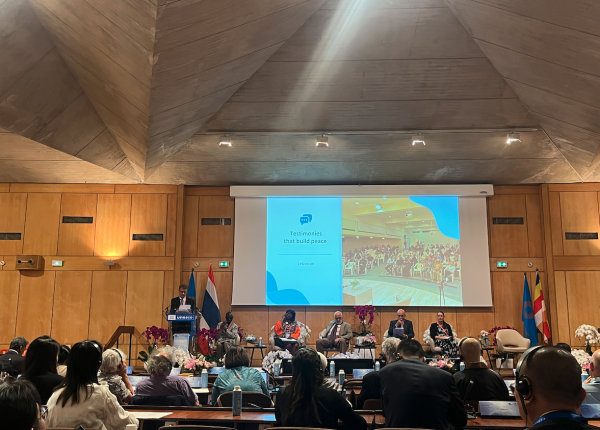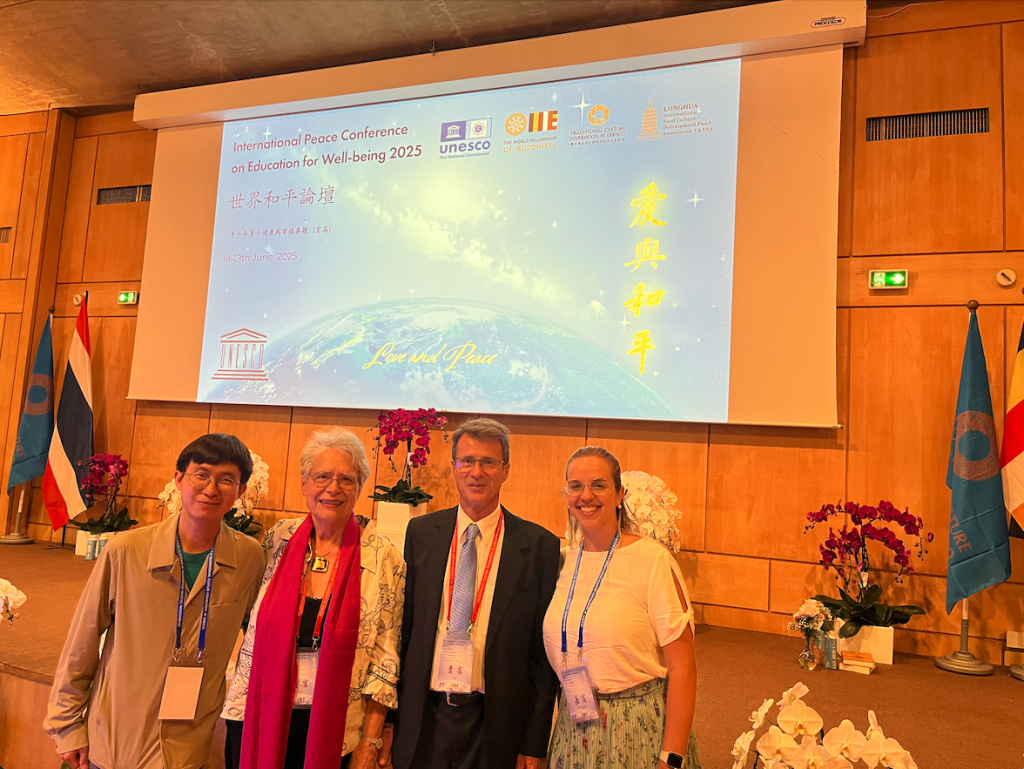New Humanity Highlights NGO Action for Interreligious Dialogue at UNESCO

Paris, 18–19 June 2025 — New Humanity NGO took part in the roundtable “Education for Dialogue: Prelude to Well-Being”, during the International Peace Conference organized by the World Fellowship of Buddhists (WFB) at UNESCO Headquarters. Held under the theme “Education for Well-Being”, the two-day event brought together global voices to explore the foundations of peace through intercultural and interreligious dialogue.
With the escalation of recent conflicts, this gathering was a crucial moment to reaffirm our shared commitment to peace and to explore concrete paths forward through dialogue and education. As noted by Professor Fabio Petito, moderator of the roundtable and expert in international relations at the University of Sussex, religions today play a vital role in shaping our understanding of what it means to be human. He emphasized that interreligious dialogue is essential for the future of education, especially in a society shaped by rapid technological change.
Representing New Humanity, Roberto Signor, from the International Centre for Interreligious Dialogue, shared powerful testimonies from communities in Slovenia, Myanmar, and Lebanon, where everyday acts of empathy and cooperation have fostered deep interfaith bonds. From supporting Turkish Muslim families in Ljubljana, to inclusive education in Yangon, to sheltering Muslim neighbors during conflict in Lebanon, these stories illustrated how dialogue rooted in trust and reciprocity becomes a transformative force for peace.
One standout initiative is the “Dice of Peace”, developed by educators inspired by the Art of Loving by Chiara Lubich. This simple yet profound tool encourages daily actions of empathy, inclusion, and active listening. It evolved into the Living Peace Project, now active in 134 countries, engaging over 2 million people, including nearly 1,000 Young Ambassadors of Peace who promote unity and intercultural understanding in their communities.
“Adopting a posture of genuine openness—seeing the other ‘with new eyes,’ through the lens of mercy and compassion—can be a transformative force in human relationships. Yet today’s societies often fail to welcome the marginalized, fueling exclusion and indifference. It’s time to choose a better way.”
Mr. Doudou Diène, former Director of UNESCO’s Department of Intercultural and Interreligious Dialogue, reminded participants of UNESCO’s founding vision: “Since wars begin in the minds of men, it is in the minds of men that the defenses of peace must be constructed.” He linked religion and peace through shared ethical values, urging a return to the roots of human dignity. Quoting an African proverb, Mr. Diène reminded the audience: “In the forest, when the branches meet, the roots hug each other too.” With this image, he emphasized that while religions may appear different on the surface, they are deeply connected through shared universal human values.
Other panelists echoed the importance of education in shaping peaceful societies. Prof. Dr. Anke Weber, president of Baraza, emphasized the need for evidence-based approaches to intercultural dialogue, including impact evaluation and local adaptation. Mme Gisèle Bedan, former Minister of Education in the Central African Republic, shared how NGOs, religious leaders, and international organizations are working together to promote non-violence, reconciliation, and community resilience.
The presence of New Humanity at this high-level event was not only a testimony to its concrete actions in the field, but also part of a broader advocacy effort to ensure that interreligious dialogue is recognized as a key dimension of UNESCO’s work—alongside intercultural dialogue. By sharing lived experiences and practical initiatives, New Humanity contributes to shaping global policy, reinforcing the message already brought forward during the 43 C/5 consultation process, where the NGO Group on Interreligious Dialogue successfully advocated for the inclusion of interreligious dialogue in UNESCO’s strategic framework for 2026–2029.



